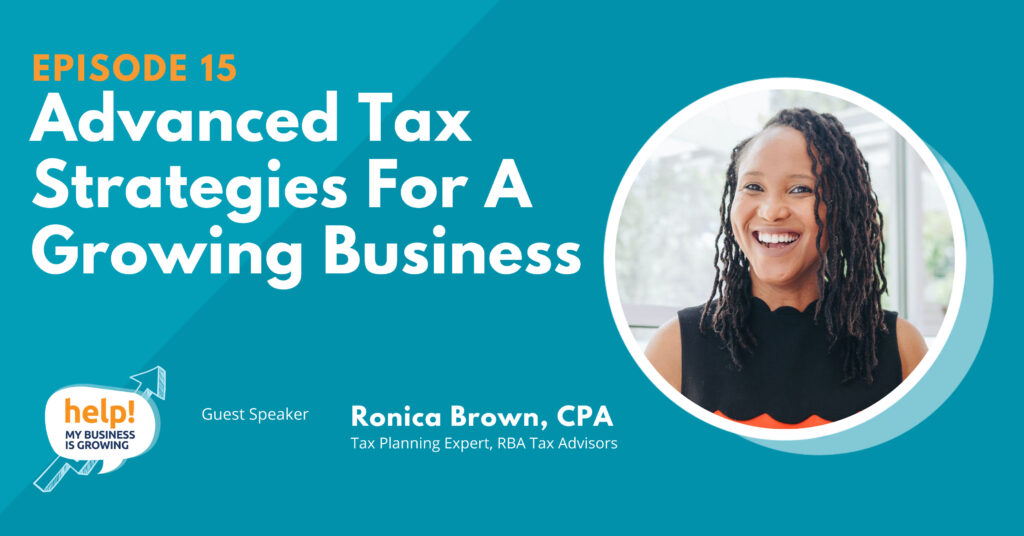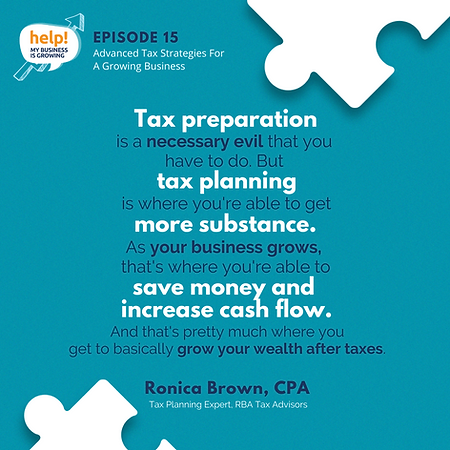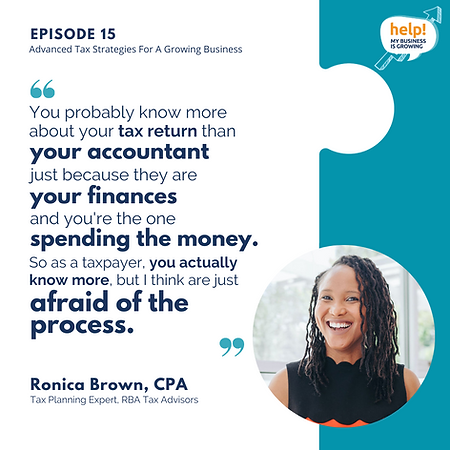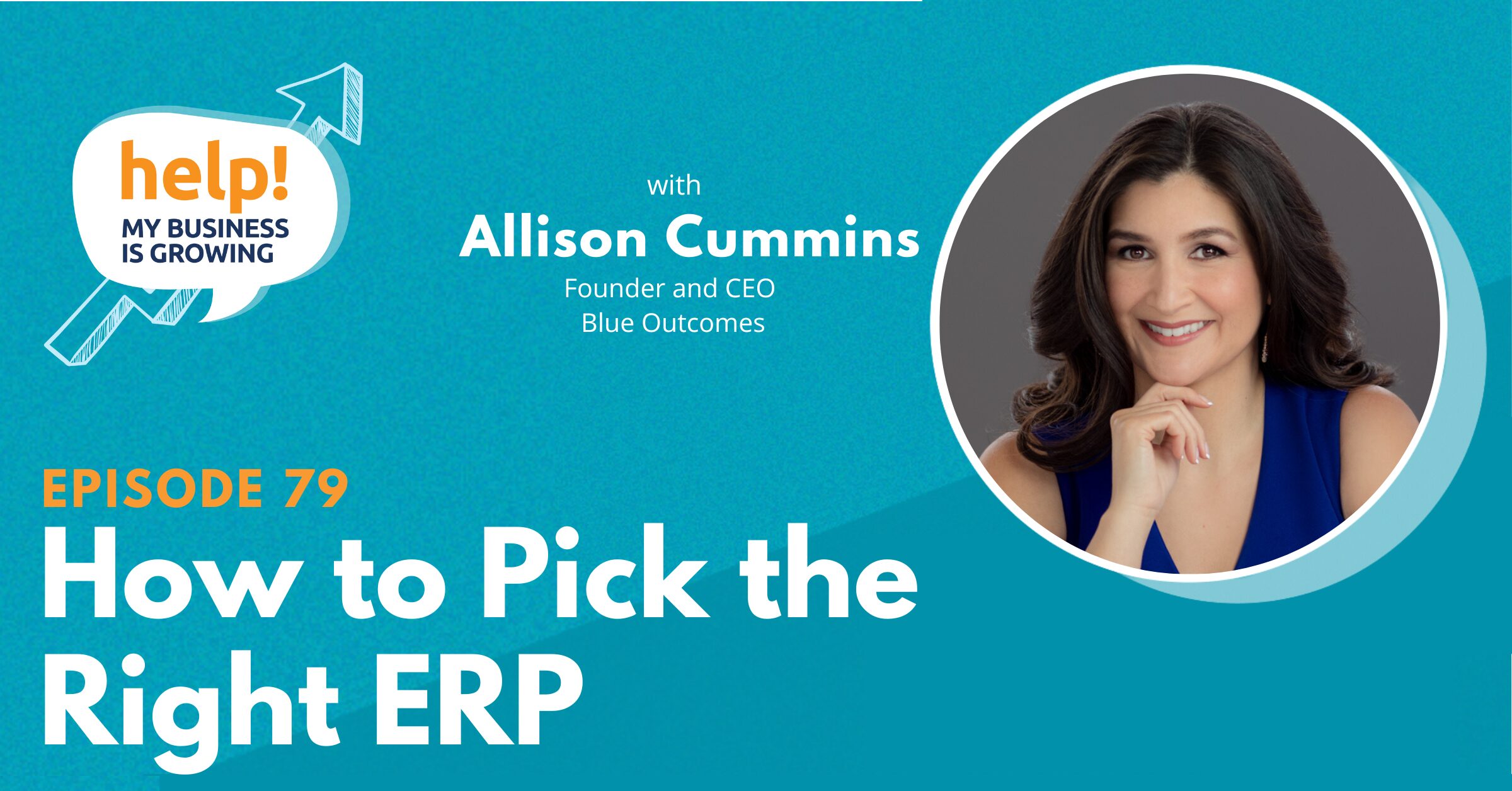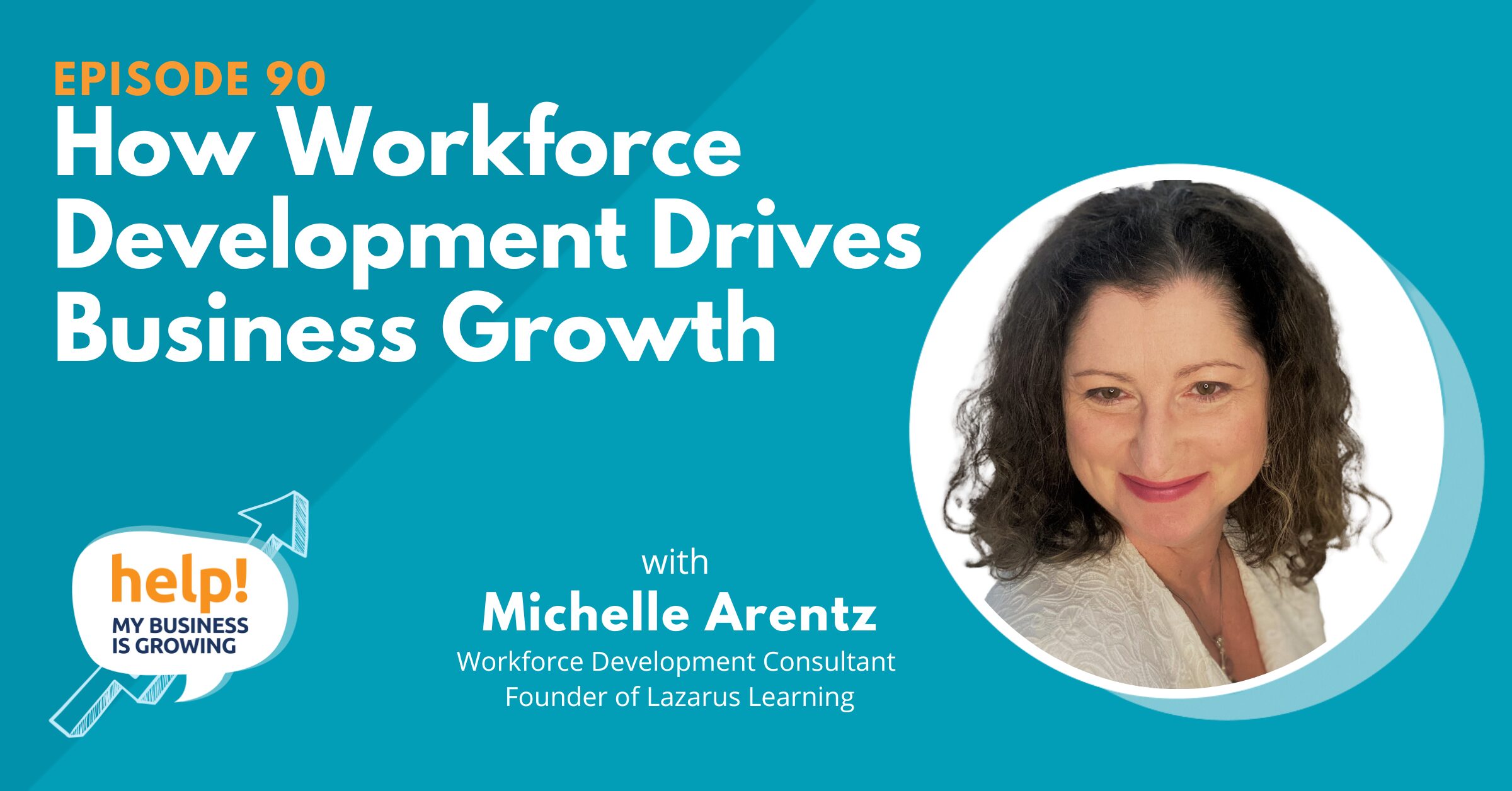Taxes can be seen as a necessary evil for many founders and business owners. They are a significant financial obligation and one you can’t afford to get wrong or mess up to protect your growing business. However, it is also possible to make taxes work for you with advanced tax strategies that can support your overall financial plan.
In today’s episode, our guest, Ronica Brown, a tax planning expert & CPA, shares how you can dig into the tax code and come up with methods that work for your business to save on your taxes.
She breaks down the process step by step on how you can implement advanced tax strategies designed to provide maximum tax reduction and wealth creation in the form of savings.
1. You need to be financially ready – meaning all your reports and data are updated.
If the financials are not in good condition, your strategic tax planning will have to wait until they get fixed. Just as it’s true for the rest of the business – you cannot make good decisions using bad data.
2. Look at the last two to three years of tax returns to look for “low-hanging fruits.”
Schedule an appointment with your tax planning service provider.
It’s a public resume where you can quickly reach out to – and vet – potential candidates.
Kathy (host):
Well, hello there and welcome back to Help! My Business is Growing, a podcast where we explore how to grow and build a business that is healthy and sustainable. I’m your host, Kathy Svetina.
Kathy (host):
In this episode, we’re going to be talking about taxes and some of the advanced tax strategies that you can explore to implement in your business to save you on taxes. But before we go any further, I do need to give you a disclaimer. Because if you’re thinking about implementing any of what we’re going to be talking about in this episode, you should always, always consult with your tax advisor to make sure that it’s a good fit for you and for your business. Because finances and taxes especially are not a one size fits all approach. So with that out of the way, I do want to introduce you to my guest on this episode.
Kathy (host):
Her name is Ronica Brown. Ronica is a tax professional with over 12 years of tax planning and tax preparation experience. She has worked with organizations of various sizes ranging from small to medium-sized enterprises to large corporations. Her aim is to help entrepreneurs rethink their tax strategies by focusing on strategic tax planning. That’s the only way to significantly reduce how much they pay in taxes. She has worked with her team to help clients reduce their tax bills by 30% or more. Those tax savings have empowered them to grow their businesses, invest and develop extra strategies. Join us.
Kathy (host):
Welcome to the show, Ronica.
Ronica (guest):
Thanks for having me, Kathy.
Kathy (host):
Business finances are such a complex topic, especially for a company that’s already in that multi-million dollar range. And for business that is growing, there’s a lot of moving pieces, and what worked before might not work anymore at the state of the company that you’re in. You have to be a lot more strategic about the finances, which also means having the proper tax strategy as well. And unfortunately, that thing is complex, so you have to work with the right people that can support you at the stage that you’re in. My first question for you, Ronica, is how is someone like yourself, who specializes in these advanced tax strategies, different from regular CPA that business owners are used to working with?
Ronica (guest):
I think a lot of it has to do with being able to equip ourselves with the correct knowledge and then also experience. A lot of tax practitioners, and may only learn to do taxes in a small business space. It means that they’ve only been trained in tax preparation. While some CPAs and tax advisers, some of them have experience outside of the scope of that. They understand the tax law. They understand how to use the tax law, and they understand how to apply it to clients. I think a lot of it, to be honest, has to do with experience, since when it comes to taxes there’s just not a lot of benchmarks. What does a person know from what a person does not know, even in the professional world?
Ronica (guest):
I think a lot of it has to do with experience and also your provider. Being able to give you a lot of new ideas and advise you on new things as your business is growing like it can’t be the same as you said it, it’s not a cookie-cutter approach. If you’re working with someone, and they’re not bringing those new ideas to the table, so that’s when you know that you may have your business may have outgrown your current tax advisor. I think that’s how we’re different. When I started my company called Going Out of Corporate, I’m from a tax planning background. Tax planning is the way that I knew. Working with small business owners, we had to push them to let them understand that tax preparation, yes, it’s the necessary evil that you have to do. But tax planning is where you’re able to get more substance. As your business grows, that’s where you’re able to save money, that’s where you’re able to increase cash flow. And that’s pretty much where you get to basically grow your wealth after taxes.
Kathy (host):
Yeah, and I want to go dive deeper into that, how do you do that, but before we get into that, I do want to ask you, if someone is looking for someone that’s going to advise them on these advanced tax strategies, and they’ve seen that their CPA might not be on that level anymore? Or they’re just not at that level to support them? How would you go about looking for someone who would be a good fit? How would you look at their experience? If they have professional experience in the corporate world? How would you go about finding someone who can support you in that multi-million dollar, growing company stage that you’re in?
Ronica (guest):
I think LinkedIn. I think it’s one of the best use when you’re looking at experience. Right? So that’s one of the ways its kind of like a person’s public resume.
Kathy (host):
Yeah.
Ronica (guest):
It’s a public resume. If you look at their LinkedIn to see what’s been their track record in terms of how much experience that they have in tax, not only within the business that they’re in right now but also outside of that. I think that like yourself, posting different communication and messages on your LinkedIn profile and things like that can help our clients to kind of, vet some of the information that we know and some of the things that we don’t know. I think that looking at posts and things like that wouldn’t be the way that I would recommend that they will basically find someone.
Ronica (guest):
I like LinkedIn over Facebook just because you have to put your resume on LinkedIn. It will work. Have you worked on what your experience was like, and what you’re focusing on in your business right now? If you go to someone’s LinkedIn profile, and it’s like tax preparation, bookkeeping, things like that, and if you decide to talk to them, you have to ask those questions in terms of what type of tax plan the work you do, how do you go about doing it and things like that to understand if you’re going to be able to bring this extra help that you’re looking for?
Kathy (host):
Yeah, these are great pointers. I always say to people, whether you hire a bookkeeper, whether it hire an accountant, a fractional CFO, like myself, or someone who’s right here with these advanced strategies, go look at their LinkedIn profile and look at where they have work, especially if it works in the corporate environment. They do bring that wealth of knowledge and experience into the small business arena that you can benefit from. Go vet them out, have a conversation with them, and see if they’re the right person for you.
Ronica (guest):
Exactly, exactly. And as a fractional CFO, I’m sure that you have seen that as well, that being able to look at that information is basically how you kind of like separate who you want to work with.
Kathy (host):
Yeah, exactly, exactly. It looked at as my number one place to go to, so I could see the resume were their work. These are great pointers to have for people who are trying to figure out who they can place in these to help them with this in their business. But I do want to ask you now, so if someone comes to you, and they bring their financial reports, financial statements, they bring you their P&L, they’re bringing their balance sheet, how do you figure out how you can maximize their tax credits? What are some of the processes that you go through? Can you take us on a journey, like what do you look at? And how do you look so that you can maximize their tax credits?
Ronica (guest):
Yes, and to be honest, once they have your financial ready, and that’s a great start the tax planning because if the financial is not in good condition, you’re stuck like we know, we have to wait until they get your finance. I’m glad that you pointed that out that once your financials are ready, you know what’s going to be the next step. Normally, what we do is look at the last two to three years of their past tax returns.
Ronica (guest):
And the reason why that’s important, especially if you’re in a business that’s growing is we’re looking for low-hanging fruits. What I mean by that is what are the easiest opportunities for us to get some more tax deductions and tax savings and for lack of a better word, low hanging fruit because 90% of the incentives and 90% of some of the deductions that a business owner is going to get. Some of it is just basic checkboxes, elections, are just basic processes that they have to go through in order to basically maximize these deductions. 90% of it is that and the next 10% of the advanced planning would come in the advanced strategies.
Ronica (guest):
Well, those would be based on how much tax liability you have and how much other investments and so forth the client has, and then we’ll be able to qualify. If we go back to have the good financials and we have two to three years of tax return and … we’re looking for the low hanging fruits. What we’re looking for are common missed deductions. And I will go back and tell you what examples of some of these are.
Ronica (guest):
Commonly mixed deductions would be one thing that we’re looking for. We’re looking looking for incorrect reporting of certain deductions. We’re looking at certain limitations like you have a business and or multiple businesses and you have rental properties or own real estate or you have something else going on. You’re investing in something else or those two basically offsetting each other. We’re looking at those type of limitations and then we’re also looking at can we change your reporting as you said before we’re starting out, your business is growing so how you started may not be the way how you continue. We’re looking at how if you make certain changes to your entity structure or something, how would maximize your deduction which will eventually reduce your taxes.
Ronica (guest):
When we go back and look at common misdeductions, take, for example, an S corporation owner. Home office deduction and what we call an Augusta rental are two things that you have to look for and you can spot those thing is in like five minutes. Are you maximum this deduction? The reason why I pointed out for S corp and like C corp filers is just that they have to go through a process called an accountable reimbursement plan. In order to take out their reimbursement for their home office.
Ronica (guest):
And a lot of times when this does not happen, maybe the bookkeeper or … it doesn’t get coded in your books that way. If it doesn’t get coded in your book as a home office setup, and that you’re actually doing that, then that’s how it gets missed on your tax return. Does that make sense?
Kathy (host):
Yeah! Yeah, it does.
Ronica (guest):
Because they didn’t go through the process of basically transferring that money to themselves, or writing that check, or whatever they do as a home office expense and letting their bookkeeper know that, then that’s how we normally get missed. Then when you look at the 14-day rental or you if you’re an S corporation, or business type of the return, type of returning your funding, are you maximizing that area where you can have meetings at your house, and basically pay yourself for having those meetings, that’s completely tax-free, you don’t have to pay taxes on it.
Ronica (guest):
We’re looking at and the list goes on, on several of these things, but we’re looking at those things that are applies to everyone and are easy to implement. When we look at the incorrect reports, enough deductions, this can just be anything to be honest. This could be anything.
Ronica (guest):
And one of the things that you also look at is how do they label stuff on a return. Your bookkeeper or your fractional CFO, you want to label things that the client is able to understand and things like that. But when it comes to your tax advisor, they don’t need to change it in the system, but they need to change it in the tax return. They need to convert what your bookkeeper or your fractional CFO is saying into tax language. Does that make sense?
Kathy (host):
Yeah, and I do say that to clients as well, that there’s a different set of books. They’re the same numbers, it’s just the way how you look that in a different because as you are looking at your company, you’re in making management decisions. You’re trying to get the insights so that you can make future decisions, what the IRS and what the tax entities are doing. They’re trying to figure out how much money you owe them. The set of reports are different, and the way how your CPA, the way how your tax person looks at the books, it’s a lot different than someone like a CFO would look who’s looking at it. How can we make management decisions versus how can we pay the IRS government?
Ronica (guest):
Right, right. While we’re reporting, we have to report in language that IRS understands, not a language for the business owners. Language IRS understanding is one of my big pet peeves. One of the biggest is coaching expenses like IRS doesn’t understand what coaching is, and you don’t want to get called into an audit and to explain how much you’re paying your business coach and what they’re doing. Right?
Ronica (guest):
Things like that, you have to change it as professional development, or you don’t name it something else in a language that IRS is going to understand. When we look at limitations, there are several things that have limitations – insurance, charitable deductions, passive activities. If you started up a site, a next business, in addition to your main company, how is that treated?
Ronica (guest):
Things like that would, if you have the incorrect reporting, then you can basically lose out on those deductions. Because you’re not matching up appropriately. If you have something that has a loss, and then you have an income, how’s that matching up? Things like that, that we look for? And then when we look at what can change.
Ronica (guest):
For example, are you still reporting your income and a Schedule C, meaning that you have an LLC or something like that, and but you’re still following your business income and expenses in your personal return? Well, we know that if that’s the case, that means that you’re paying more taxes than you need to. Change that over to S corp, C corp, or something like that will give you a better deduction.
Ronica (guest):
Going through those processes and to see how can we go ahead and fix this. Sometimes it’s based on the change that you need to make. Sometimes you can go backwards. You’re actively and x40 deductions that you have missed in the past few years. Sometimes you’re able to do that, sometimes you can’t. So that so that’s what 90% of the process is to be honest, is identify those low hanging fruits, identify those simple deductions that can add up to 50, 100, $150,000 that you don’t have to spend more money on so that you can maximize, maximize them.
Kathy (host):
These are great examples. Thank you for that. You talked about switching to a score of… when is the time that you would say that someone should be thinking about moving from the LLC to the S corp, or maybe to the C corp, even when would be the right time to do that?
Ronica (guest):
I honestly don’t have a right or wrong time for it. But what I normally, if you’re not an S corp starting out, the best time I think is when it makes sense, when you can say, “If I do this, I’m going to save $5,000 on my taxes, or I’m going to save $21,000.” I used to have $1,000 because I have an example with someone what would existed with new clients right now that we’re going to converted him and his staff is going to be $21,000 worth of self-employment taxes that he is going to be able to save.
Ronica (guest):
It’s like how much is it going to save if your business is still small enough that you’re not going to see the savings? Then I would say you can just hold off on it. But if you’re able to identify some savings, whether it’s 3000, 4000, $5,000, I’ll say go ahead and do it once you’re able to quantify how much is able to save you just because the S corp we at least have to have one more minutes and things like that it’s more formality.
Ronica (guest):
And if the business owner is not into formality, then I mean, I think that saving the taxes and becoming a formal business person is more of a better idea, in my mind, but you know I’m an accountant. And maybe that’s why that won’t be a big deal for me, but I guess it depends, but I think that 90 to 95 or 99% of the time, and S corp will always be the better option.
Kathy (host):
Yeah, that’s helpful. And we’ve talked about this low-hanging fruit, and there’s a lot of it. You can go through the list and figure out which ones apply to you. But I’m going to talk more about these advanced strategies that normal business owners don’t really know about. If you can give us an example of like two to three, and I know this is a disclaimer here, you should always talk to your tax person before you try to apply any of this in your business. But I do want to at least have people be aware of that, what are some of the advanced tax strategies that you’ve seen that have really made that dent in people’s tax bills.
Ronica (guest):
One of the big ones is being able to get tax credits on the open market in exchange for your tax dollars. One, this can be significant savings, not only that, it saves you on your taxes, but it also gives you cash flow in the future.
Ronica (guest):
For example, you have done everything that you can do, every single thing. And let’s say, at the end of the day, you still owe $100,000. The IRS gives you the option to either pay them that $100,000. And this is an example, I’m not trying to get the math right. This is an example. There is given an example the IRS gives the opportunity to instead of giving them at $100,000, you can go and invest that into say a solar partnership, solar contracts. You don’t have to buy solar to put on your house, or anything like that. But you can go in and exchange it for like a solar partnership interest. You get the credit offsets your taxes. Your taxes are down to zero. You don’t owe the IRS anything. And what you get in return for your investment is cash flow on an annual. Some companies paid out on a quarterly basis. You basically turn your tax liability into an investment. Does that make sense?
Kathy (host):
Yeah, that’s actually interesting. How does one especially in this example of a solar, I want to stick with that. How does that one do that? How do you look for this partnership? And is that a government that gives you a couple of options or how does that look like?
Ronica (guest):
That’s always a hard question to answer. Sometimes the solar offerings may be able to approach individuals. But normally, I think more it’s the CPA letting you know that this is out there. Does that make sense? It’s a CPA knowing that you can take advantage of credit just because that CPA is up to date on what are some of the tax products that can help someone reduce your taxes. Normally, that conversation is going to come from a solar credit. I think that they have so many opportunities and so many large like Amazon and those companies that are buying their credits that they don’t have to offer it to individuals. It’s made in most cases is the CPA that’s bringing that idea to the table.
Ronica (guest):
That’s why I say that, you know, most times you have to be working with someone that is bringing new ideas to the table. And that’s one of the ideas that people in the tax planning world have. When you find a CPA that’s in that space that they’ll be able, to give you several options like that.
Kathy (host):
In this particular example of a solar idea, let’s say that it was you that brought this to the table and I’m not sure if you had any clients that you suggested to or already, but when you brought it to the table, this is one of the ideas and the client went with it. How did that process look like for this solar partnership? Did they go find a company of their own that they would partner with? How does that look like?
Ronica (guest):
Normally, in that case, we would go with a vendor that we’ve already vetted. What that means that we’ve already done due diligence on the contracts. We’ve already done, you know myself and other groups, CPA groups that do due diligence on. We’ve normally already vetted them. In most cases, we already know who these providers are, who has the good products, and who have the ones that are going to be able to stand up to our inquiry or things like that. That’s one of the things that’s important in the tax space is that your provider, you’re supposed to go with vendors with have products that are pretty vetted, and have a pretty good track record of passing IRS audits and things like that.
Kathy (host):
And I think that’s something that people should also take into account in when they’re vetting their CPAs and people they’re helping with the tax strategies if they have connections in that community what are the vendors that they work with so that they can also get the benefit of the people that they have been pre-vetted that they’ve done the due diligence on so that you get that benefit from your provider as well, right.
Ronica (guest):
Yeah exactly. I would recommend anyone, go out there and start Googling solar contracts and stuff. You’ll come across them. There are several companies all over the country and especially now with the new tax proposal, these contracts are going to get these savings, are going to get bigger in the green energy and space. There’s gonna be a lot more than just because there’s a lot of government money that’s going into this space in it. They’re pushing a lot of money into it what clean energy or green energy.
Kathy (host):
Yep.
Ronica (guest):
Solar, wind, energy, things like that. They want these industries to grow over the next 20 years, there’s a lot of tax dollars and when that happens is these companies are able to pass on the savings that to there, to your clients.
Ronica (guest):
It’s similar to production companies, right? Film companies, choose to go to certain states based on a tax credit that the state is going to get them or that the state is going to give them and what these film companies do, they can’t take all these credits. You’re not able to write off all these credits on your taxes so they exchange them with taxpayers. They say “Okay, I can give you a $10,000 discount on your taxes if you buy my filming credit.” These things are not only in the renewable, clean energy space. It’s also in film and other industries that they’re looking at that. Sometimes estate offer it, sometimes it’s a federal government.
Kathy (host):
If you like, we can probably make a whole episode based on this topic alone, right?
Ronica (guest):
I know, because others are coming to mind. I’m like, “Oh, my gosh, use me to be a good example.” Even for like state taxes. If people pay attention to taxes, they know that you can’t deduct state taxes that you pay to the state your property taxes over $10,000. But how do you get around that and some state has charities that you can donate your state tax dollars to, and get a charitable deduction? And that’s your way out of that $10,000 limit. There’s so many things that are out there some small some larger, but if you combine the effect of those, can you imagine how much you’re able to take advantage of?
Kathy (host):
Yeah, yeah, for sure. And we talked about these tax credits. What is another I want to, I want to give people another example of an advanced tax strategy that they can potentially look into? Do you have another example that you can give us?
Ronica (guest):
I think a next one that can be applicable to a wider audience would be hiring your child. For families, if you have children, and if your office at home or say, for instance, you’re a medical office and your children come there, what can you get them to do? Can they be involved in your marketing? Do you post pictures of them on your social or LinkedIn or whatever? Do you have them take the trash out of your office? Whether it’s your home office, so what so how can you get some of that tax-free money from yourself, and then after your children, which they don’t pretty much pay any taxes on it when done correctly. And that’s one of the ways to get some.
Ronica (guest):
You can go to 12 or $18,000 per child and get some cash tax-free out of the business. Once you combine the effects of how your child, Augusta rental, taking money for your home office, and things like that, you can pretty much get up to a good 50,000 of tax-free cash quite easily.
Kathy (host):
What are some of the documentation that you need to have if you do end up hiring your child as a tax strategy so that you can prove that they are actually doing things in the business?
Ronica (guest):
Right, so you do have to keep track of what they’re doing. We give our clients a tracker of what they’re keeping track of. Kid did this, kid is a model for my business. They were included in say 50 posts for the year. What’s the rate for that? Is it 250 per post, 150 per post as a modeling rate, or things like that?
Ronica (guest):
You have to keep track of what are the tasks that you’re assigned to your child. It should be age-appropriate. Of course. Those are a couple so but I think that the big thing is just documentation. A lot of people have their kids doing things for them, and they may not even think about it that it could be. It would be a business task if they just documented.
Kathy (host):
Yeah, and I know a lot of people that actually have their children legitimately do like video editing for them, or they play in Canva. Or they really do a lot of stuff for the business and do not take advantage of that.
Ronica (guest):
Social media, things like that. Or you can change them to get your tax documents together. You track up your receipts and organize yourself based on what the child likes to do.
Kathy (host):
You know Ronica, These are all fabulous examples. And I thank you for that. I always have this one question for every single guest that comes on the show. And that is what can someone do today that will give them closer to having a good strategy, tax strategy in place? What can you do today?
Ronica (guest):
I’m gonna say schedule an appointment with your provider. Stop waiting until tax season. Stop being afraid, go ahead, schedule an appointment. Whether that’s an over zoom, or however your provider works schedule an appointment, and I think one of the best tasks is also to let them do a little virtual walkthrough of a tax return. Put up a tax return and say, “I just want to understand what’s going on on my tax return. What are some of the deductions I’m getting and just go through?” And I think that’s one of the exercises that you’re going to see that it’s not that intimidating as long as you’re able to read, and you know what numbers mean. You know that it is a 100, is that 50,000. It is like you can probably tell your accountant more about your tax return then they know just because it’s your finances and you’re the one spending the money.
Ronica (guest):
As a taxpayer actually know more but I think that people are just afraid of the process. I said go ahead and schedule an appointment. You know, let them walk you through to return and then start asking some questions. “Did I get in this deduction for taking my dog to the park, don’t think it’s stupid. Just ask whatever question that you have and deceive these things are deductible. And you know, if that makes sense and you know, what are some of the ideas that they have? And what else can you do to reduce your taxes and to see if your provider has any other ideas for you? And if not, then you know, we’re here and we’re always able to help.
Kathy (host):
And this is a great segment into what I wanted to ask is where can listeners get in touch with you and how can they follow you on social media? What do you have available out there?
Ronica (guest):
My website is rbataxadvisors.com. And you can find me on LinkedIn as Ronica Brown, CPA and I’m also on Instagram as @rbataxadvisors.
Kathy (host):
Awesome. Thank you so much, Ronica, for being in the show. This was really delightful and you give us so many good ideas. Thank you so much!
Ronica (guest):
Thank you. Thank you for having me.
Kathy (host):
I hope that this conversation sparked some ideas for you on the options that you have available to reduce your tax bill. And I do hope that you get that meeting with a tax person to go through them. Because as I mentioned, as your business grows, tax planning should be a part of your regular financial agenda and not just a yearly event.
Kathy (host):
And hey, before I go, I do have a favor to ask. If you’re listening to this on the Apple podcast. If you could please go to the show. Tap the number of stars that you think the show deserves because it helps other people find it. Thanks so much. Until next time!
Ronica Brown is a tax planning expert and certified public accountant (CPA) with over 12 years of tax planning and tax preparation experience.
She is also the owner of RBA Tax Advisors. By focusing on strategic tax planning, she and her team work with organizations of various sizes ranging from SMEs to large corporations, helping them rethink their tax strategies and reduce their tax bills by 30% or more. These tax savings have empowered them to grow their businesses, invest, and develop exit strategies.
However, tax planning isn’t the only aspect of Ronica’s life. She’s a wife and mother who is passionate about gardening and cooking. In fact, she has a wide variety of plants in her backyard.
